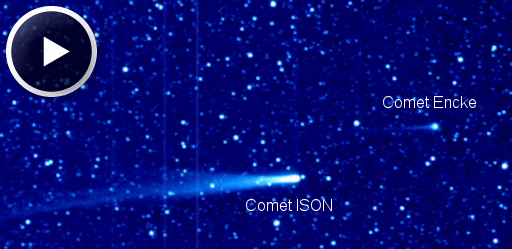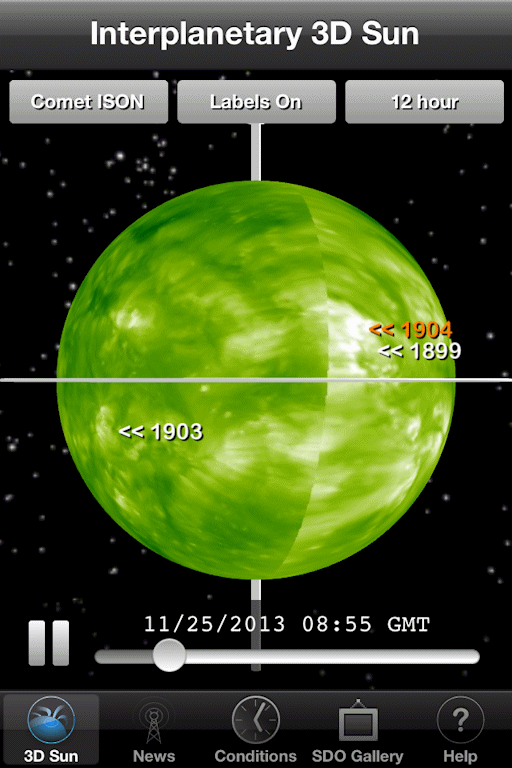Hmmmm, more evidence that Comet ISON may be the reason for the #flare and #CME outburst lately from our Sun. ISON to reach #Perihelion on 28.11.2013.
Not to mention: Now is the peak of #SolarMaximum
We will talk about this tonight on #SitPrep 6p EST on USAEBN Radio - www.usaebn.org
"There has been a Coronal Mass Ejection from the Sun, and early indications are that it may be heading in the general direction of Comet ISON. We cannot confirm this at this time, however. Note that the video is in 2D, so the CME could go either behind or in front of ISON, which appears in the lower left of this image from the STEREO B Satellite.
It will be interesting to see how this affects ISON, if at all, but this is certainly fascinating stuff! We will keep you informed as we get more information, but do not have any additional information at this time."
~Paul http://www.facebook.com/AccuAstronomy
COMET ISON, SO FAR SO GOOD: Comet ISON is hurtling toward the sun today at 240,000 mph and, despite the rising heat, the comet appears to be intact. Yesterday, reports of fading spectral lines from the comet's core raised concerns that the icy nucleus might be disintegrating. Current images from NASA and ESA spacecraft, however, show the comet still going strong.
Published on Nov 26, 2013
This movie from the spacecraft's
Heliospheric Imager shows Comet ISON, Mercury, Comet Encke andEarth over
a five-day period from Nov. 20 to Nov. 25, 2013. The sun sits right of
the field of view of this camera. Credit: NASA/STEREO
Download a copy of this video at http://svs.gsfc.nasa.gov/vis/a010000/...
Download a copy of this video at http://svs.gsfc.nasa.gov/vis/a010000/...
SLIGHT CHANCE OF FLARES: The Earthside of the sun is quiet. NOAA forecasters estimate a slim 1% chance of either M- or X-class solar flares on Nov. 27th. However, there is at least one active region on the farside of the sun which could target Comet ISON when it swings around the farside after Nov. 28th. Solar flare alerts: text, voice
The comet's entrance coincides with
a bright CME racing away from the sun's southwestern
limb. Astronomers have been wondering what might
happen if a
CME strikes Comet ISON. This CME, however, will
probably miss. The source of the cloud is a farside
active region, which is not directly facing the
comet.
NASA's STEREO-A spacecraft is also
monitoring the comet.
Click to view a high-resolution
movie (32 MB), which compresses 96 hours into less
than 1 minute:
The movie spans a 3+ day interval
from Nov. 21 to Nov. 24 roughly centered on the
period when astronomers at the IRAM telescope in
Spain recorded fading emission lines from the comet's
core. Zoom your movie-player to full screen: Although
"puffs" of material can be seen billowing
down the comet's tail, the comet itself does not
appear to be disintegrating. So what caused the
fade...?
"I will admit that I was pretty worried yesterday morning when reports of lower production rates came in," says Matthew Knight of the Lowell Observatory and NASA's Comet ISON Observation Campaign. "However, the STEREO-A brightness has increased steadily over the subsequent 36 hr, and I'm more optimistic again. My off-the-cuff thought is that there was an [outburst of dust, which dampened the emission lines] from roughly Nov 20-22, and it has returned to brightening again."
Astronomer Karl Battams of NASA's
Comet ISON Observing Campaign urges readers to remember
the following: "Comet ISON is a dynamically
new sungrazing comet, fresh in from the Oort Cloud,
and the last time we saw an object like this was
never! Furthermore, a sungrazing
comet just days from perihelion has never been studied
in this kind of detail - we're breaking new ground!
When we factor in your standard 'comets are unpredictable'
disclaimer, what we have is a huge recipe for the
unknown."
New Education Internet Radio with USA Emergency Broadcasting Network on BlogTalkRadio
WHICH SIDE OF THE
SUN IS FACING COMET ISON? When Comet
ISON sweeps through the sun's atmosphere on Nov.
28th, it will be in the 'hot zone' for CMEs. A strike
by one of the massive storm clouds probably wouldn't
destroy the comet, but it could have a
dramatic effect on the comet's fragile tail.
The odds of a strike depend on which side of the
sun is facing the comet at the time of the flyby.
This is something you can monitor using a NASA iPhone
app called the Interplanetary
3D Sun:
The app displays an interactive 3D
model of the entire sun photographed by extreme
UV cameras onboard NASA's twin STEREO probes. The
data are realtime and fully interactive (pinch,
spin and zoom). As shown in this
target list, you can view the sun from many
locations around the solar system--including Comet
ISON.
Active regions are color-coded by
their potential for flares: Orange
means "expect M-class
solar flares," while red
denotes sunspots capable of X-flares.
In the screen shot above we see that, on Nov. 25th,
Comet ISON was bearing down on an active region,
AR1904, that posed
a threat for M-class eruptions. What is targeting
the comet today? Download
the app and find out.
Solar flare alerts:
text,
voice
Madtown Preppers Alerts are for informational use only. These alerts purpose is to inform you of news events in order for you to adjust your family preparedness programs. We believe that knowledge is power and in order for you to make informed decisions, we try and bring you verified information, not to increase fear but to inform you. We do not endorse any of the sources we link to in any article.
.JPG) |
NebShip Shop Survival/Bushcraft/Off Grid Living |

Fire/Cooking/Bushcraft (4) 
Off Grid COM/Power (6) 
Knives/Blades/Custom Edged Tools (4) 
Water/Storage/Safety





No comments:
Post a Comment